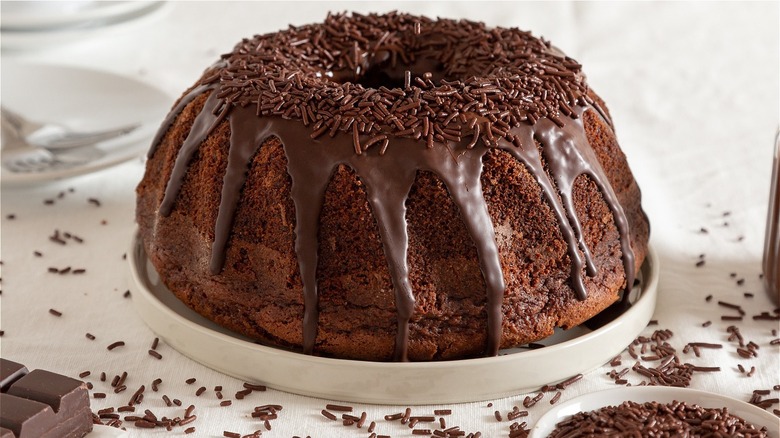The Contentious History Of Chocolate Sprinkles
When it comes to whipping up colossal ice cream sundaes, freshly baked cookies, festive birthday cakes, buttery fairy bread or hagelslag, and other sweet treats, there exists a tiny but mighty ingredient that adds color, flavor, and texture in a single morsel: sprinkles! The itty bitty confections, whether you grew up calling them "hundreds and thousands," nonpareils, or something else, are the definition of pizzazz.
In fact, the candies are so iconic in the culinary sphere that the world's first cupcake bakery, Sprinkles, even adopted their namesake. They also come in a variety of hues, from the entirety of the rainbow spectrum to shimmering golds, silvers, and pearlescents.
Brown sprinkles, in particular, are generally chocolate-flavored, and they are an extremely popular ice cream topping in Boston, Philadelphia, and various regions throughout the U.S. According to MyRecipes, many consumers began calling them "jimmies," a trademarked term, in the 1920s. But why are chocolate sprinkles, of all the styles of the decorative flecks, often considered so controversial?
Chocolate sprinkles have mysterious origins
Like many other foods, including macaroni and cheese, chocolate chip cookies, and Caprese salad, the bona fide inception of sprinkles has been up for debate for generations. While some folks swear by its French or Dutch origins, many others claim sprinkles were actually an American-born product, according to MyRecipes.
There are numerous stories behind the name "jimmies." Per The Boston Globe, some people stand by the theory that the name originated from the Jimmy Fund, a Boston-based cancer charity. However, others believe they were named after a man by the name of Jimmy, who worked at the Just Born candy company when he pioneered chocolate sprinkles. Amid all the possibilities, the Globe suspects that Just Born, the confectionery behind divisive indulgences such as Peeps and Hot Tamales, is likely the real source for the whimsical nickname for sprinkles.
There's also another unfortunate theory that the term "jimmies" are an audacious reference to Jim Crow laws, which legitimized anti-Black racism and segregation after the American Civil War. Thankfully, that myth has been debunked, per Snopes and other fact checkers.

